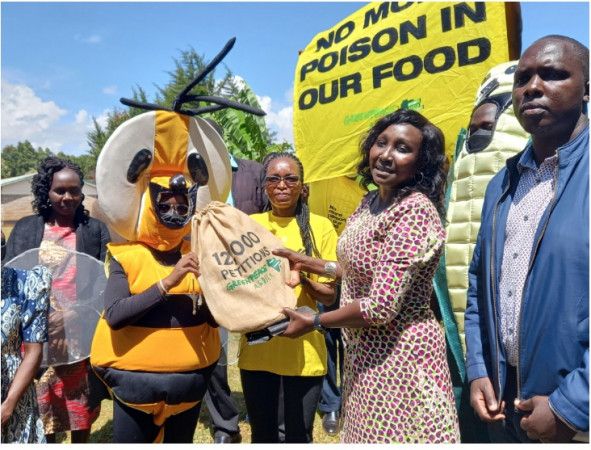Chemicals in food remains major killer, studies show

Food will remain one of the major killers in the country if the government continues dithering on the ban of agrochemicals which studies have found to contain killer toxins, lobbies have warned.
INADES Formation Kenya, Biodiversity and Biosafety Association of Kenya (BIBA-K), Kenya Organic Agriculture Network (KOAN) and PELUM Kenya called on the government to ban harmful pesticides which have been banned elsewhere but continue to be used freely in the country.
The lobbies spoke during a workshop to promote healthy eating.
The campaign warns against the toxicity and use of chemical pesticides and fertilizers for humans and the environment.
“Toxicity is an obstacle to the right to food and therefore food production methods that do not subscribe to the use of pesticides and chemicals should be adopted,” said INADES Formation Managing Director Joseph Mwongela Munywoki.
BIBA-Kenya coordinator Anne Maina said upto 24 agrochemicals in the market have the potential to cause cancer while another 24 could cause damaging genetic changes.
Affect hormones
Yet others have been found by studies to negatively affect hormones and reproduction.
“Some of the foods rejected at the airport, for instance, because of high residue levels still find their way to the local markets,” said Ms Maina.
She said the locust infestation in the 2020 worsened the situation.
“Research found that as high as 10 times of the chemical amounts required to kill locusts were found in one case in Samburu County,” Ms Maina said.
The most notorious of the agrochemicals include glyphosate, commonly known as Roundup which was classified in 2015 as probably cancer-causing.
In 2019, a US court also ordered Bayer/Monsanto to pay damages of $2 billion to a man whose cancer was said to have been partly caused by the Roundup herbicide, regulators are under pressure to ban the use of glyphosate.
In the wake of the US court ruling, regulators are under pressure to ban the use of glyphosate.
The Pest Control Products Board (PCPB), however, ruled out any intentions to ban glyphosate-based products.
Others are Fenitrothion, Chlorpyrifos and Fipronil which have hazardous active ingredients, yet they were fronted by PCPB for the control of the desert locusts.
Most farmers, experts said, rely on agrovets rather than agriculture extension officers, to manage pests and diseases which they say has led to abuse.
The result has been an increase in and the mushrooming of crop protection products particularly those that are banned elsewhere in the world but are being extensively used in farming across Kenya.
Eustace Kiarie, an organic expert at the KOAN said: “The farmers largely get their advice from agrovets – who inadvertently are in the business of making a profit. Often farmers hardly recognize the active ingredients in some of these products.”
Agrovets in the two counties, Kiarie noted, recommended to farmers’ pesticides and agrochemical products which contained up to 43 of the banned active ingredients in Europe.
“A study which focused on Kirinyaga and Murang’a counties found tomatoes, which are one of the most consumed food crop products, emerged as the leading crop in which pesticides are largely misused,” said Kiarie.
Embrace agroecology
PELUM Kenya country director Rosinah Mbenya urged farmers to embrace agro-ecology which she said has a biological way of managing pests and diseases.
“The government needs to put more efforts and funding in encouraging the use of biopesticides and professional extension services,” Ms Mbenya said.
The lobbyists say that although there are no safe synthetic pesticides, pesticides that are of low threat should be promoted while making optimum use of integrated pest management.
In November last year, more than 12,000 Kenyans demanded for the removal of toxic pesticides in the country through signing a public petition,
“No More Poison In Our Food,” by Greenpeace Africa which was submitted to the National Assembly.
The signatures were in support of the parliamentary petition tabled by Uasin Gishu Woman Rep- elect Gladys Shollei in 2019 with a view to withdrawing harmful chemical pesticides from the Kenyan market.
They said upto 32 percent of the agrochemicals used in Kenya had been banned over human and animal safety.










